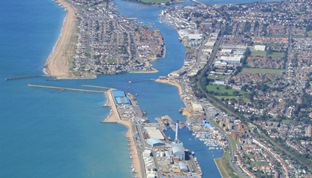Marine source heat pump
The BBC has discovered that modern technology can heat old houses and gives heat pumps a warm welcome.
Plas Newyyd, a National Trust property in Anglesey, will save £40,000 a year by switching to heat pumps instead of burning oil to keep itself warm. In this case the National Trust is using a marine source heat pump to transfer heat from the Menai Strait into the building.
Plas Newydd was formerly the National Trust's biggest oil consumer, spending £70,000 a year on oil. On some winter days the 18th century mansion was consuming around 1,500 litres of oil a day – the same as a typical house would use in ten months.
Now it will be heated with a new on-site clean energy system, which pumps sea water from the Menai Strait in front of the property, through pipes to and from a heat exchanger on the shore, and then up 30 metres of cliff face to the mansion's boiler house.
The 300kW marine source heat pump cost £600,000 to install and is expected to save the charity around £40,000 a year in operating costs. This will be ploughed back into the conservation of this elegant mansion, which includes a military uniform collection.

Adam Ellis-Jones, Assistant Director for Operations in Wales at the National Trust, said: We've got an important collection that needs to be looked after here at Plas Newydd, and the new heating system will ensure we can conserve it for future generations to enjoy. It's about selecting the appropriate technology for each of our special places. We've chosen a renewable that works with and blends in with the landscape.
Patrick Begg, rural enterprises director at the National Trust, said: This is a transformative scheme. I couldn't be more delighted that Plas Newydd, a really sensitive and special place, is not only converting to clean energy, but taking the lead on innovation.
It's clear to us that we need to make big changes so that we can continue to protect our treasured places and tackle the impacts of climate change. This successful scheme marks a major step forwards in our clean energy journey.
A heat pump can concentrate heat by compressing refrigerant gases into a small volume and then transfer the heat into buildings to provide warmth via a heat exchanger. The refrigerant gas becomes cold when the pressure is released and this coldness can be exchanged with warmer water from the sea – and the cycle can be repeated continuously. The effect is that heat is transferred from the sea into the building.
Marine source heat pump benefits from the thermal inertia of the ocean
The BBC article makes some interesting points:
- Heat pumps are likely to become more common as the UK attempts to decarbonise its heating systems
- The use of heat pumps is growing as the government looks to subsidise low-carbon heat sources
- heat pumps will have a shorter payback for properties not connected to the gas grid
- air source heat pumps, which heat exchange with the air outside, are cheaper to install than ground source heat pumps, but they are at their least efficient on the coldest days. The sea is warmer than the air in winter, so a marine source heat pump is more efficient than an air source heat pump – because of the thermal inertia of the ocean from the previous summer.
The ground is also warmer than the air in winter, so a ground source heat pump is also more efficient than an air source heat pump – because of the thermal inertia of the ground from the previous summer.
It is possible to go one major step further in exploiting the thermal inertia of the immoveable thermal mass of the ground – by adding solar heat to the ground in summer in order to recycle the heat with a heat pump the following winter: Underground Thermal Energy Storage.
Heat pumps can play an important role in balancing supply and demand
The BBC article also observes that: "Heat pumps could also play an important role in balancing supply and demand in future energy systems. Electricity is difficult to store, but heat can be stored easily in the form of hot water."
In fact heat pumps will be able to play a far more significant part when it is understood that heat pumps can do much more than store a small amount of heat overnight in small hot water tanks: heat pumps can play a significant part in interseasonal heat transfer systems when the ground itself can be used as a very large store of solar heat energy from summer to winter.

Shoreham Harbour Marine Source Heat Pump
ICAX has installed a marine source heat pump to Maritime House owned by the Shoreham Port Authority. The Maritime House office building was previously heated by an oil boiler.
ICAX has designed an abstraction and rejection system to cope with the corrosive potential of salt water and biological growth and potential fouling from molluscs and other maritime debris.
The ICAX heat pump was designed to provide a high temperature flow to the building so that the existing heat distribution system within Maritime House did not need to be refurbished. This saved time and avoided disruption so that the retrofit was completed with minimum interruption to the work that goes on in the building.
See Ground Source Heating Ground Source Cooling Ground Source Energy



